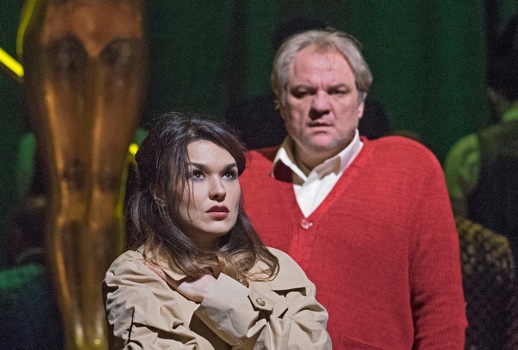
However, it seems that she has been directed to behave like a callow teenager—a choice that makes some sense within the context of the plot, though the effect comes off as half-baked. For example, when the soprano sings the famous “Caro nome,” she is directed to write into a small diary, confiding her first flush of romance to the page. While the aria suggests the revelation of sexual awakening, as Gilda steps into this mysterious world of adulthood, Mayer’s direction portrays her as a child in the throes of puppy love.
It’s not that the choice is invalid, but that it reduces Gilda’s subjectivity to a superficial level, making the tragedy that concludes the opera more perverse than noble. Moreover, Peretyatko’s demeanor was sweetly innocent enough, her beautiful face beaming with youthful exuberance. She needed no additional parlor tricks to indicate Gilda’s inexperience.
As her father, Rigoletto, Zeljko Luciv used his sizable, cutting baritone to bring out all the pathos, humiliation, and rage inherent to the role. His portrayal was nuanced and clear, each gesture arising from a specific dramatic impulse. He was especially moving in his scenes with Gilda, in which he and Peretyatko illuminated the more tender aspects of filial love.
In contrast, Stephen Costello flounced about the stage doing his best imitation of Bobby Darin, but he came off more like Jimmy Fallon in a Saturday Night Live skit. His Duke was a broad sketch, uptight and awkward, leaving little room for vulnerability or spontaneity. Moreover, his scenes with Gilda offer no hint of chemistry. The voice, on the other hand, sounded dependably handsome—better than it has done in the past few years, in fact—but his top notes, as before, lacked the radiance one would expect from his middle. His final note, sung from the wings, was by far the best produced, and consequently the most frustrating.
And in the fascinating role of Sparafucile, Andrea Mastroni brings sex and danger to a role that could easily be a one-note wonder (low F). Especially during his duet with Rigoletto in Act I, his voice and demeanor display all the oily charisma one could desire. As his sister, the saucy Maddelena, Oksana Volkova provided a female counterpoint to this figure, with a warm, mellow mezzo-soprano and a delightfully glib approach to murder and theft.
Pier Girogio Morandi’s conducting, a debut at the house, showed a keen attention to detail as he drove the orchestra with confident grandeur, then pulled back the reins to great effect. Under his baton, the score menaced and seethed with aggressive, muscular phrasing.
Mayer’s production offered an odd mix of brilliance and ineptitude. His neon sets are slick and clever, with a seedy flair appropriate for the material. While his “concept” works in some ways, especially within the homosocial domain of the Duke, it also feels a little stretched and gimmicky—like superimposing an idea simply for the sake of being clever, and not truly investigating the meat and bones of Verdi’s text.
However, there is a wonderfully murky aspect to the production. One image I cannot erase from my mind occurs during the first act, when Gilda is abducted by a horde of men: it is the pathetic legs of Giovanna, whose body lies on the threshold of the elevator. The doors move to close, but cannot, and so they rear back mechanically, only to try to close again. Whether the woman has been murdered or simply knocked unconscious is difficult to determine, but the effect is chilling.
And when Gilda steps out to greet her father in the Act II, her dress torn away and her undergarments ripped, one gets a better sense of the stakes involved in such a “practical joke”—how Rigoletto can compare the tongue and the dagger in “Pari siamo.” As Rigoletto knows all too well from his experiences with the Duke, the masculine sphere is not safe for women; this is especially true for an unworldly girl like Gilda. This undercurrent of violence and anxiety remains a modern concern, as women today still navigate through our own treacherous topographies of rape culture.
Instead of the traditional sense of a director offering a reading of Rigoletto, in this instance Rigoletto reads our own culture. And this highlights the universality of Rigoletto’s themes: volatile relationships between the sexes, intergenerational conflict, and the violence woven throughout. Rigoletto is a work so dramatically adept that it can withstand the poetic license of a shortsighted director. In other words, the opera is genius, working to deepen our understanding of the human condition, whether set in 1960s Las Vegas or 16th Century Mantua.
Photo by Karen Almond.



